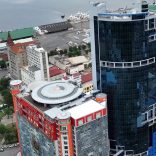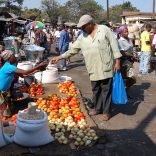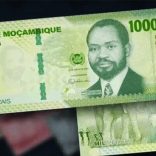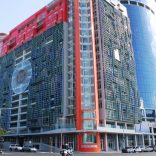Mozambique: Central bank concerned about entities that illegally collect deposits
Mozambique must move towards austerity – Luísa Diogo

Photo: O País
Former Mozambican prime minister Luísa Diogo argues that the country must move towards stronger tightening measures, stressing this must be done with transparency to ensure the understanding of citizens.
Mozambique sees the resumption, this year, of direct support to the state budget from Bretton Woods institutions the IMF and World Bank.
The IMF is seen as a gauge of the level of creditworthiness of countries. Immediately after the IMF board approved the resumption of its first support to Mozambique in six years, the World Bank also announced US$300 million in direct support, on condition that the Mozambican economy be managed more rigorously.
Yesterday, former prime minister and former minister of finance and economy Luísa Diogo said that she has no doubt that, from now on, the government would introduce rigorous reforms, which could “be painful”.
“It is better to anticipate that there will be measures that are painful, but whose results are worth it,” Diogo said, encouraging the government to continue with the reforms.
What’s more, the return of the IMF coincides with a difficult time for the entire world, with Russia and Ukraine at war, implying restrictions on the export of Russian oil.
As a result, there is less fuel available or, at best, the price tends to increase. In Mozambique, gas stations have even threatened to stop supplying fuel if the price is not increased this month.
Luísa Diogo understands that this is a risk that the country cannot take, because “it would be the worst situation we could go through as a country”. “Often, the government has to find ways to balance things between consumers, distributors and importers of this fundamental product for our economy,” the former minister said.
In other words, a rise in fuel prices is part of rigorous macro-economic management, which implies tightening, and is therefore inevitable.
However, Diogo says that each of the measures must be properly explained, that is, it must be transparent when the time for austerity arrives.
“And don’t get tired of explaining, because there’s a lot to explain. Explaining to and in the Assembly of the Republic and to the public through the media,” is her recommendation. “Explaining what is being done helps us to think better, helps us to find better solutions and, when we find better solutions, we correct them here and there and that helps the country to continue moving forward.”
And one of the paths to be followed now is to look for financing, taking advantage of the green light given by the IMF, but it must be responsible indebtedness. The first step, according to Diogo, is to define a debt strategy, in which “we must forget about the commercial debt, because we are not in a position to pay”. At the moment, for example, “we are strangled by terrible commercial debt, which cannot be forgiven”.
Furthermore, “if we wanted to go after the commercial debt, we wouldn’t need the IMF. Now, we have to borrow according to our ability to pay. We have to leverage IMF and World Bank financing, with many years to pay and low interest rates”, Diogo proposed.
Luísa Diogo was speaking this Thursday (12-05) on the sidelines of the announcement of the winners of a start-up contest promoted by Total Energies, of which she is patron. The former prime minister said she was proud to participate, and believed that the project had “legs to walk with”, considering the rigour of the selection.
By Afonso Chavo












Leave a Reply
Be the First to Comment!
You must be logged in to post a comment.
You must be logged in to post a comment.